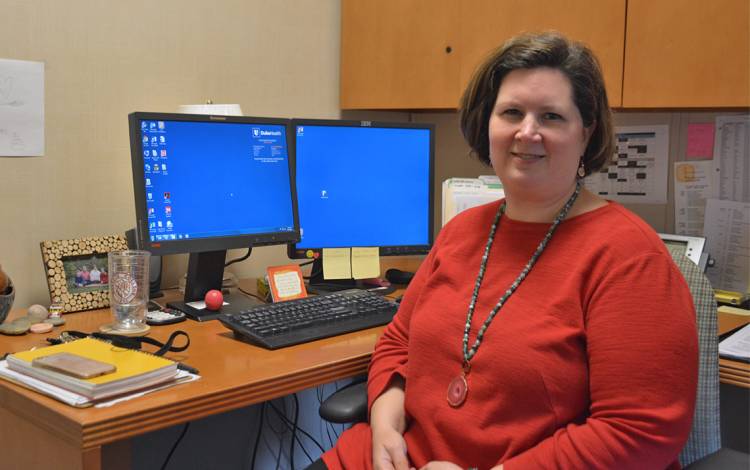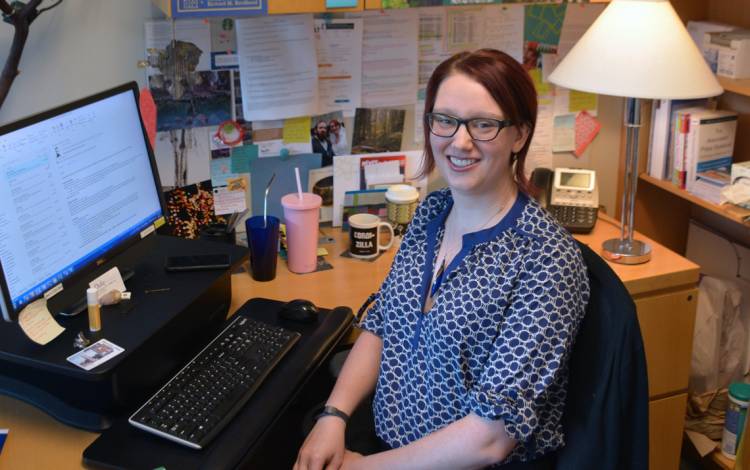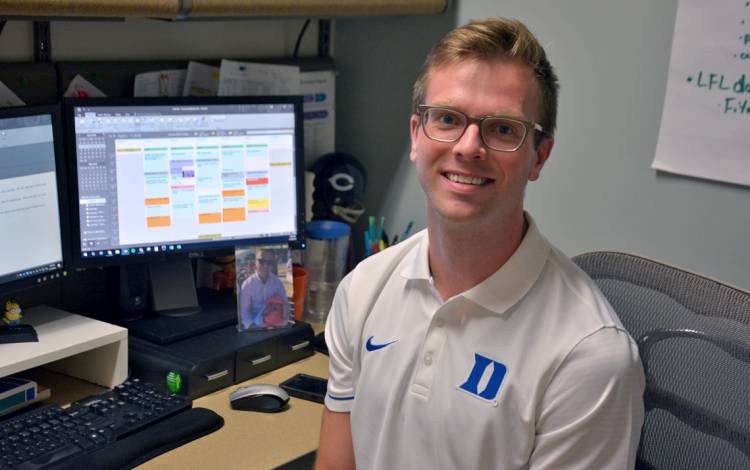4 Ways to Beat a Work Crunch
Feeling overwhelmed? Focus energy by asking for help, making a list and more

Nikki Baskin’s work days from November to March are much of the same.
The associate director of Duke Undergraduate Admissions starts the day at 7 a.m. with a steaming cup of coffee and queue full of applications from prospective Duke undergraduates. Over six months, Baskin and the Duke Undergraduate Admissions staff will read about 37,000 applications.
Her trick to surviving the intense period is to do one thing she enjoys every day. The Duke Admissions officers enjoy playing trivia with friends, watching Duke basketball and running as fun ways to relieve stress during their work crunch.
“I like to stretch my brain in different directions,” said Baskin, who’s worked for Duke Admissions for 11 years. “I encourage the Duke Admissions staff to enjoy doing something fun. Otherwise, reading season can overwhelm us.”
Doing something you enjoy is one step you can take to get through a busy work crunch. Abby Farrell, senior practice partner for Duke’s Learning & Organization Development, said it’s important to think of the big picture when an intense work stretch comes.
“Taking five minutes to write a to-do list or have some coffee is going to help you focus your energy to get through a project,” she said.
Here are four ways you can get through a work crunch.
Ask for help

Teresa Keever started off this year by juggling two positions.
Keever, health center administrator for Duke Integrative Medicine, took on the business manager role while her colleague was on parental leave.
“I am one of those people that’s willing to do everything,” Keever said. “It wasn’t always my first thought to ask somebody for help.”
In order to avoid late nights and working through lunch, which she did in the past, Keever asked a coworker to take on handling invoices for Duke Integrative Medicine, a task normally designated to the business manager.
“There was actually a win-win to asking for help,” Keever said. “The person that helped out with invoicing learned a new skill and gained some knowledge. It gave me some breathing room in my day.”
It’s OK to say ‘no’ to scope creep

Mary Catherine Hall has learned when to say no.
Hall, development assistant for the Nasher Museum of Art, helps develop exhibition receptions, membership events and more. Because the museum usually works at least six months in advance, she said it’s easy to add assignments to a project.
“You begin to think ‘Wow, this program can do seven different things,’” Hall said. “You have to catch yourself. If we agreed the goals of this program are ‘X’, then it’s not that it can’t accomplish the other things, but we need to figure out if it’s worth the resources and time.”
Continuous and uncontrolled growth of a project is known as scope creep. Farrell, with Learning & Organization Development, said it’s important to define what the project will be in the early planning stages to avoid unnecessary work and stress later on.
“It’s very important you stay focused on your original goals,” Farrell said.
Keep a detailed calendar

It only takes a few seconds for Tim Bisantz to comprehend his online calendar for the week.
All of Bisantz’s meetings, work tasks and breaks are meticulously scheduled and color-coded on his calendar. Bisantz marks lunch with red, meetings in purple and flexible worktime and breaks with blue.
Bisantz said color-coding tasks helps him stay focused because he is able to easily decipher what projects take more time and energy. He also can quickly see when he has a break in his day.
“I work better when I break down my tasks and schedule them,” he said. “It helps with transitioning tasks when I have a clear understanding of what I should be doing next.”
Bisantz began meticulously organizing his calendar in grad school while researching his thesis topics, working as a graduate assistant and holding an internship.
“I find I focus better when I’m diligently following my calendar,” he said. “Scheduling tasks gives me a clear understanding of how long I should work on something and plan accordingly for future assignments.”
Keep a to-do list

Before she leaves work for the day, Baskin, the associate of Duke Admissions, writes a to-do list for the following day.
She organizes the list by area – travel, information sessions and reading admission applications – and then ranks the projects in each section by most to least time consuming. Creating an organized list helps Baskin focus on her first – and sometimes most time-consuming task –immediately after walking in the office.
“I know I’m sharper in the morning, so I try to start my day with tasks that take longer,” Baskin said. “It gives me a sense of accomplishment to cross a major project off by mid-day.”
Farrell said she organizes her to-do list by sticky note. As projects change and deadlines loom closer for some assignments, she easily reorganizes the notes by what needs to be done first.
“Lists add much needed structure to your workdays,” she said. “It helps set expectations for yourself on what you need to get done.”
Got a story idea or news to share? Share it with Working@Duke.